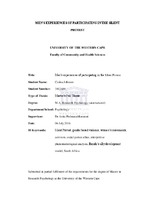| dc.description.abstract | This study aimed to investigate how male university students become involved in activism to end sexual violence against women. Historically, gender-based violence (GBV) prevention efforts have been a women's issue and men have not typically been part of this violence prevention picture. However, in the past two decades there have been increasing efforts to involve men. This has been motivated by growing recognition that, "while most men do not use violence against women, when violence does occur it is perpetrated largely by men and the ideas and behaviours linked to masculinity are highly influential in men's use of violence against women" (Flood 2011, p. 361). This project focuses on the Silent Protest, a campaign against sexual violence initiated in 2006 at Rhodes University. Since its inception the Silent Protest exclusively recruited women but, in 2011, men were actively invited and encouraged to participate as allies in activism to end sexual violence. This study aims to investigate the pathways through which male university students come to be involved in the Silent Protest and the meanings they derive from participation in protest activities. Men who participated in the Silent Protest were interviewed and the transcripts were analysed from an interpretative phenomenological framework. It was found that participation was motivated by an awareness of rape as a significant societal problem, a desire to make a difference, wanting emotional closure and as a result of the influence of family and friends. Participation resulted in both negative and positive experiences for male students. Positive experiences included a sense of accomplishment and pride and a sense of solidarity whilst negative experiences were feelings of helplessness, guilt and shock, feeling drained, and feeling grouped with rapists. Enhancing knowledge in this area can serve a critical role in informing outreach efforts on how best to engage and involve men in working towards ending sexual violence against women. | en_US |

